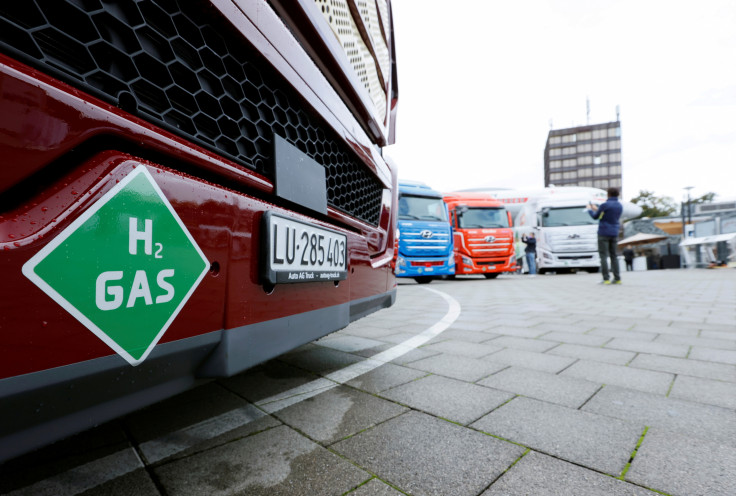Hydrogen transport projects in North East England awarded £8 million in government funding
Airport vehicles and supermarket delivery trucks are set to benefit from upcoming hydrogen transport projects taking place in Tees Valley.

In an effort to encourage more green-friendly and environmentally supportive transport across the nation, the British government has handed £8 million in investment to hydrogen transport projects in North East England. This will allow for an increase in employment opportunities in the Tees Valley region as well as help bolster the nation's economy.
The government is keener than ever to promote hydrogen-fuelled vehicles so that transportation in Britain works towards eliminating CO2 output through using low-carbon energy sources as soon as possible.
The projects announced by Transport Secretary, Mark Harper, including one being led by low-emission transportation company, ULEMCo, will focus on ground-based airport vehicles such as tow trucks for the aeroplanes and runway sweepers becoming hydrogen fuelled. A portion of the £8 million investment will go towards this project and the base for it will be at Teesside International Airport in Darlington, where the aim is to achieve net zero by 2030.
Managing Director of Teesside International Airport, Phil Forster, spoke positively about the airport's involvement with the project and why it is relevant. He stated: "We're working hard to make Teesside an airport people can be proud of – and that doesn't just mean flying to the destinations people love. It's about acting responsibly, for the good of our local people and businesses and the future of our planet."
The other hydrogen transport project selected for funding from the government involves a hydrogen refuelling station network, Element 2, where more stations being built are desired in order to have the necessary infrastructure to increase hydrogen usage for vehicle fuelling. The government funding will provide for the opening of four brand-new hydrogen refuelling stations that will be openly accessible to the public.
This will increase the number of hydrogen refuelling stations in Britain by 50 per cent and will help fuel all sorts of vehicles such as supermarket delivery trucks as well as heavy goods vehicles with hydrogen to ensure more efficient and greener journeys.
Colleges in the Tees Valley region will receive £300,000 directly in order for the locals to be up-skilled and so that a learning base is formed where new talent can be fostered and help maintain the area's status as the leaders in British hydrogen projects for further generations.
The Transport Secretary touched on the importance of hydrogen moving forward and Tees Valley's role in the process. He stated: "Hydrogen technology has great potential to decarbonise transport and help grow the economy. Today's winners illustrate the expertise the Tees Valley has as a pioneer in developing hydrogen tech."
Crucial in helping Britain reach net zero levels will be sorting out how to lower the carbon emissions of heavy and unique vehicles, such as airport vehicles, so the ULEMCo project will play a vital role in helping to deliver that. Hydrogen usage already exists in areas of the nation as buses have been fuelled with it and that has led to there being a strong prevention of exhaust emissions.
Britain stepping up its usage of hydrogen and prioritising projects centred around it will allow its transport industry to be recognised as friendly towards the environment and help front a global charge to maximise the impact around other locations across the world.
Tees Valley is home to the nation's single hydrogen transport hub and this new flurry of investment will only strengthen its operations as it will be able to continue focusing on new innovative ideas and growing its pool of experts by way of further employment possibilities. Investment is sure to keep on coming along for hydrogen transport projects as Tees Valley's hub has been receiving private investment and government funding in the millions since it opened in 2020.
This new funding towards the Tees Valley hydrogen transport hub is the second to occur after the government provided investment first towards the development of vehicles powered by hydrogen. Over £2.6 million was given to the various winners of the pledged investment such as Toyota and Hydrogen Vehicle Systems.
Toyota provided hydrogen vehicles for local police forces to use when out on operations whilst Hydrogen Vehicle Systems came up with a valuable solution for major supermarkets when delivering a mass number of groceries as a hydrogen-powered van was developed.
The hydrogen sector appears to be one that will continue to grow and increase in relevance due to the evidence of recent forecasts. The estimations have suggested that by the start of the next decade, more than 12,000 jobs could be provided in the hydrogen industry and private investment worth close to £10 billion could be available.
Elsewhere, Kellogg's has received more than £3 million from the government to help incorporate hydrogen into its daily operations at its Manchester factory to reduce its emission output.
© Copyright IBTimes 2025. All rights reserved.






















